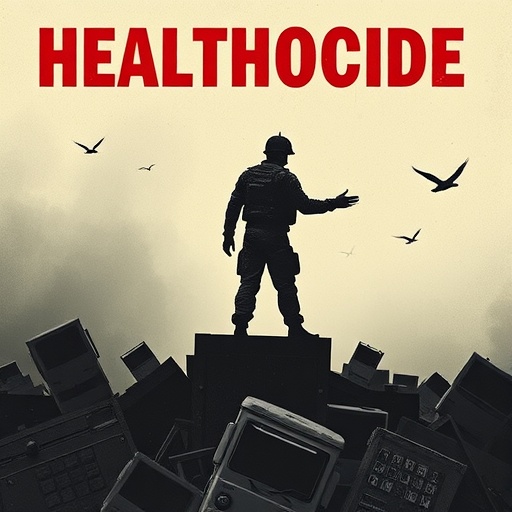In contemporary armed conflicts, the systematic targeting and destruction of healthcare services and personnel have emerged as a devastating tactic with profound humanitarian repercussions. This calculated obliteration of medical infrastructure and staff, aptly coined as ‘healthocide,’ represents a new and alarming form of warfare that directly contravenes the principles of international humanitarian law and medical ethics. A recent commentary published in BMJ Global Health highlights this evolving and pernicious phenomenon, urging healthcare professionals worldwide to acknowledge and resist the weaponization of healthcare systems that has escalated in multiple recent conflicts.
The concept of healthocide extends beyond isolated incidents of violence against healthcare workers or facilities; it embodies a deliberate and strategic campaign aimed at crippling health services to incapacitate entire populations. Medical practitioners are no longer mere bystanders but are called upon to intervene actively by exposing these violations and advocating for stringent enforcement of international statutes designed to protect medical neutrality. This neutrality, once fiercely guarded since its origins in the 19th century and reinforced after the atrocities of World War II, is under unprecedented threat in today’s warfare landscape.
Recent data from Lebanon’s Ministry of Public Health paints a grim picture of the consequences of healthocide in the Middle East. Between October 2023 and January 2025, the Israel Defense Forces were implicated in the deaths of 217 healthcare workers, alongside extensive damage to ambulances and hospital facilities. Similarly, in Gaza, military operations since October 7, 2023, have claimed the lives of nearly a thousand medical workers spanning diverse roles—from doctors and nurses to pharmacists and civil defense personnel—further evidencing the scale and severity of these targeted assaults.
The targeting of healthcare infrastructure is not merely collateral damage but a calculated violation explicitly designed to obstruct access to critical care. Ambulances have been obstructed or even attacked deliberately, creating insurmountable barriers for patients requiring emergency treatment and for healthcare providers striving to offer lifesaving care. This methodical erosion of medical access violates the sanctity of health services and blatantly disregards protections enshrined under international humanitarian law aimed at shielding civilians in conflict zones.
The commentary’s authors emphasize the profound silence and inadequate responses from prominent medical associations, particularly in Western nations that wield considerable influence on the global stage. This reticence is not benign; it tacitly endorses the erosion of medical neutrality by failing to hold perpetrators accountable or by issuing delayed and insufficient condemnations. Such passivity risks normalizing healthocide, which, if left unchecked, could rupture the ethical foundations upon which impartial medical care during conflicts is predicated.
The principle of medical neutrality, forged through centuries of conflict and ethical evolution, demands that healthcare workers operate free from political affiliations or belligerent agendas. It requires that all parties to a conflict respect and protect medical personnel and facilities to ensure equitable care for the wounded and ill. Eroding this principle risks militarizing healthcare and transforming hospitals and clinics from sanctuaries into strategic targets, a transformation with catastrophic consequences for civilian populations.
The authors also call attention to the broader implications of the evolving nature of warfare, characterized by the integration of Artificial Intelligence, autonomous drones, and banned weaponry. This technological shift exacerbates the challenges to healthcare protection as weapons become more indiscriminate and lethal, increasing civilian casualties and overwhelming already fragile health systems. In this landscape, the deliberate destruction of healthcare assumes an even more insidious role as a weapon designed to maximize human suffering and societal destabilization.
The term ‘healthocide’ encapsulates more than the physical destruction of infrastructure; it denotes a form of ideological warfare where health systems become collateral victims of political animus. This targeted annihilation serves to negate any semblance of security or normalcy for affected populations, effectively weaponizing health to achieve broader strategic aims. The acknowledgment of healthocide as a distinct war crime is thus imperative for developing legal and ethical frameworks robust enough to deter such actions.
Importantly, the commentary underscores that medical neutrality is inherently interconnected with social justice and human rights. It is not an apolitical stance but one that embodies solidarity with humanity and the promotion of equitable, health-enabling policies. Medical professionals, therefore, bear a dual responsibility to their patients and to the broader societal commitment to justice, necessitating active resistance against efforts to normalize the destruction of healthcare.
Physicians and healthcare workers are urged to document violations meticulously and advocate for the enforcement of justice under international law. Such documentation not only supports accountability but also serves as a powerful tool against the normalization and trivialization of attacks on healthcare. The persistent failure to address these violations only emboldens perpetrators and deepens the humanitarian crises spawned by ongoing conflicts.
The commentary concludes with a stark admonition against silent complicity. The normalization of healthocide threatens to erode the fragile frameworks that safeguard humanity in times of war, compromising the ethos of medicine and undermining international legal protections. Instead of passive observation, the medical community is implored to engage in critical reflection and take decisive action, reinforcing that silence equates to consent in the face of such grave ethical breaches.
In summation, the deliberate targeting of healthcare services during armed conflicts represents a new frontier in the weaponization of war, demanding urgent attention and response. The erosion of medical neutrality and the normalization of healthocide constitute serious threats not only to the immediate well-being of affected populations but also to the foundational ethical and legal norms that underpin global humanitarian efforts. It is incumbent upon healthcare professionals, policymakers, and the international community to confront and counter these trends before the consequences become irreparable.
Subject of Research: People
Article Title: Healthocide and medical neutrality: a call for action and reflection
News Publication Date: 5-Aug-2025
Web References: http://dx.doi.org/10.1136/bmjgh-2024-018656
Keywords: War, Health care




